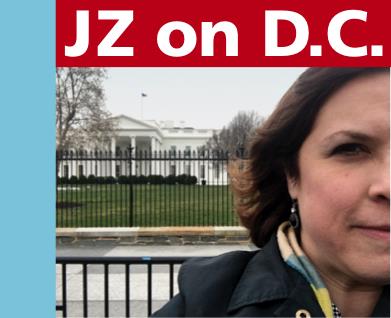3/1/2019
JZ on D.C.
Jennifer Zurko

Welcome to our new expanded section that will include news, views, commentary and event coverage about the goings-on in our government. Our goal is to keep you informed about the policies and legislation that directly affect our industry. If you have anything you’d like to share, email me at jzurko@ballpublishing.com.
Industry ADVOCATES: Society of American Florists
Labor Issues May Become Prominent in 2019
After two years of little action on labor issues in Washington with Republicans in control of both chambers of Congress and President Trump in the White House, activity may increase in 2019 with the Democratic takeover of the House.
The “Raise the Wage Act” was introduced in the House and Senate to increase the federal minimum wage and the House bill currently has 193 co-sponsors, while the Senate legislation has 30 co-sponsors. The Raise the Wage Act would gradually increase the federal minimum wage to $15 per hour by 2024, index the rate to increase and eliminate the “tip credit” where tipped employees can be paid less than the minimum wage because their tips make up the difference.
In addition to legislation to increase the federal minimum wage, the Trump Administration may issue new overtime regulations. The U.S. Department of Labor (DOL) held several “listening sessions” to hear from the public about a possible new rule on overtime compensation.
In January, DOL sent a Notice of Proposed Rulemaking (NPRM) on the “white collar” overtime exemptions to the White House Office of Management and Budget (OMB) for review. OMB review is the final step before publication of the proposed rule in the Federal Register. Review of the rule could take several months, after which a proposed rule could be issued.
In 2016, the Obama Administration issued an overtime rule that would have more than doubled the minimum salary level required to exempt executive, administrative and professional employees from eligibility for overtime. A federal judge blocked that rule.
The Trump Administration rule is likely to increase the minimum salary required for exemption from overtime, but not as high as the Obama Administration rule would have established.
Another issue that may be considered is federally-mandated paid leave and paid vacation time. Although it hasn’t yet been introduced in the 116th Congress, the Family and Medical Insurance Leave (FAMILY) Act has been introduced in the last several Congresses.
The FAMILY Act would require that employers provide paid family and medical leave to employees for up to 12 weeks annually for the birth or adoption of a new child, the illness of a family member or an employee’s own medical condition.
The Guaranteed Paid Vacation Act may also be considered. Last introduced by Senator Bernie Sanders (I-VT) during the 114th Congress, the bill would mandate employers with 15 or more employees to provide a minimum of 10 days of paid vacation to their employees, including part-time employees who work an average of 24 hours a week.
SAF will continue to actively inform lawmakers of the impact of these proposals on the floriculture industry and to ensure that our members’ voices are heard in Washington.
Shawn McBurney, Senior Director—Government Relations
The State of the Green Industry
 Despite the Polar Vortex heavily covering the Midwest with record-breaking, sub-Antarctica temperatures, AmericanHort’s VP of Government Relations & Research Craig Regelbrugge made it into the Chicago area to give an update on what’s going on policy-wise to the attendees of the iLandscape show in late January.
Despite the Polar Vortex heavily covering the Midwest with record-breaking, sub-Antarctica temperatures, AmericanHort’s VP of Government Relations & Research Craig Regelbrugge made it into the Chicago area to give an update on what’s going on policy-wise to the attendees of the iLandscape show in late January.
Craig’s given versions of this talk before (this one with some of Dr. Charlie Hall’s economic outlook stats peppered into the beginning) and with the molasses-like movement of government and a recent change in the guard (at least in the House), much of the information he provided hasn’t changed much. But there were a few new tidbits and highlights:
• Usually in divided government, it forces policy-makers to sit down and talk to each other, but in the current climate, they haven’t done that. It remains to be seen if this will change.
• 101 brand new congresspeople were elected to the House. Craig said that he thinks a lot of these freshman are “problem-solvers.”
• Craig feels that eventually E-verify will be mandatory across the whole country, but it MUST come without the current red tape and documentation issues that bog down a lot of employers.
• AmericanHort is aggressively trying to convince the Department of Homeland Security to at least maintain the current H-2B cap, which totaled 82,000 visas in 2018.
And a few new “Craig-isms”:
• “When one party controls everything, they tend to lose perspective.”
• “If you’re not sitting at the table, you’ll be on the menu.”
Meaning you have to get involved! At the very least, with your local legislature, if not your federal representatives. You can start
by attending AmericanHort’s Impact Washington event September 16-18. Registration is set to open March 18.
Industry ADVOCATES: AmericanHort
AmericanHort’s Legislative & Policy Agenda for 2019
Legislative and regulatory priorities for AmericanHort’s advocacy team center around workforce and transportation issues, research funding and implementation, environmental regulation, and horticultural trade and marketplace issues. The advocacy team plans to focus on these issues during the 116th Congress, which began in early January.
This agenda is a living document, with the possibility of other issues being incorporated as they materialize. Key bills focusing on the issues listed will be added as they’re introduced.
As a roadmap for advocacy activities, these issues will also be the main focus at the AmericanHort Impact Washington advocacy summit, which will take place September 16-18.
The legislative landscape is shaping up to be a difficult one, as the specter of a 2020 presidential election is already manifesting, combined with the legislative stalemate immigration reform and border security.
Despite the current dysfunction, AmericanHort leaders and advocacy team will continue to push for positive outcomes
on industry priorities. After all, many of our priorities and initiatives don’t depend on Congress to advance.
Tal Coley, Director of Government Affairs